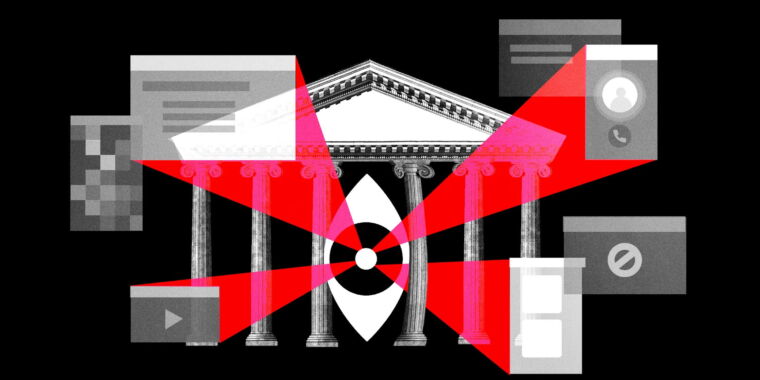“This is the most extreme type of monitoring that I’ve seen,” says Pilar Weiss, founder of the National Bail Fund Network, a network of over 90 community bail and bond funds across the United States. “It’s part of a disturbing trend where deep surveillance and social control applications are used pretrial with little oversight.”



Prosecutors and judges really need a reminder of the concept of innocent until proven guilty.
And:
Any reasonable person would describe that as not just a punishment, but a pretty severe one.
And one that affects children. Having a teenager know that a person she never met, who she has no way to contact, is looking at her activity every minute isn’t just punishment in fact. It’s victimization.
Thus, I think we can conclude from this that the Monroe County, Indiana prosecutors office is victimizing children. Full stop. Time to make some arrests.
The very idea that they can forcibly monitor the entire families devices in order for him to be granted bail is insane. Personally, I think the idea of not being allowed any electronic device shouldn’t be allowed anymore, but using that as a pretext to affect the entire family is absurd.
Absolutely.
In 1950, if you were told as a pretrial release condition, you weren’t allowed to use paper because your alleged crime involved a book, no one would have thought that reasonable. Today, devices are the equivalent of paper.
I agree that this is cruel and unusual punishment, however, I strongly dislike the paper == computer metaphor. The two are hardly comparable.
Compared to paper, it is easy to comit serious crimes from the comfort of your own home with a computer. Computers facilitate Lightspeed communication, and can be used for instantaneous financial transaction. They can be used to collect information anonymously, and deseminate information publically.
Very very different risk levels.
That said, subjecting an entire family to 24/7 electronic surveillance (and making them pay for it!?!) Is fucked up. I think we need a different paradigm for dealing with “e-criminals” like perhaps the state provides state-administered devices to those charges with electronic crimes? Idrk, but this ain’t it cheif.
Computers are remarkably efficient but at the dawn of the Gutenberg press, you could have made similar observations. For the first time with paper, it was possible to commit crimes in the privacy of your own home merely by writing things down and sending them to a publisher.
Except for the “instantaneous” and “Lightspeed” observations, which I think are the real key here. Also, commiting a book crime would require conscious cooperation and coordination with another person/people (the publisher), whereas internet crimes can be done completely solo.
I think a more sensible comparison could be made between computers and telephones or telegraphs
It’s more efficient, certainly. But telling someone pretrial in 2023 they can’t use a computer isn’t realistic.
In large part I agree, however, it leaves a problem unsolved.
In the case of cp possession/production, how do you effectively sanitize a person’s internet traffic?
I think providing devices that only connect to state DNS servers, and only serve approved content could be one way. But it also raises privacy concerns.
Honestly I would argue it doesn’t matter in either case.
If it is about possession, there just isn’t enough of a negative effect from allowing someone to look at that stuff for another month or so to justify serious infringement on rights without a conviction. The abuse has happened, and a single individual looking at it some more won’t affect things much. And after an actual conviction they’ll just be in prison, or after release you would have a justification to monitor at least their own internet traffic.
If it’s about production, the internet traffic isn’t likely to be the problem. Someone sexually abusing children isn’t likely to stop just because they can’t put it on the internet anymore. At that point you’d rather need to keep them away from children in the first place.
Part of the premise of the criminal justice system is supposed to be that the system is designed to occasionally fail to punish the guilty if it protects the innocent. That’s often expressed as, “it’s better to let 10 guilty men go free than 1 innocent man go to prison.”
You might just have to accept that you can’t always be completely sure that someone’s internet usage is sanitized. Could they reoffend awaiting trial? Possibly. Same as letting an alleged mugger walk the streets until trial or an alleged rapist be around women. Innocent until proven guilty means that, as it stands right now until a verdict otherwise is returned, an innocent man and his family are having their right to use a very basic feature of modern existence, the internet, infringed upon.
Doesn’t this also violate right to privacy of everyone else in the home? I smell a civil rights issue.
Oh totally. And they’re not even alleged to have done anything wrong.
The prosecutor will say “well they could have lived in a Four Seasons instead of with their father.” Prosecutors are seldom reasonable people.
I believe the judge actually said something to the effect of “they chose to live with him still, and consented to the app”
It’s also clear interference in this person’s ability to organize a defense, which is yet another way it could be unconstitutional.
Time to sue
Wasn’t there some other big police wrongdoing case in Monroe County Indiana recently? I can’t think of another reason I’d recognize a county in a state i don’t live in.